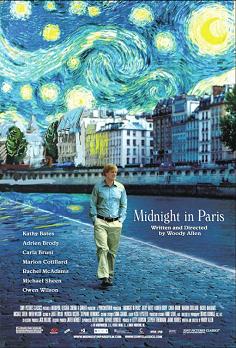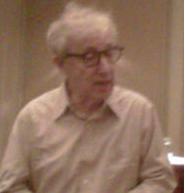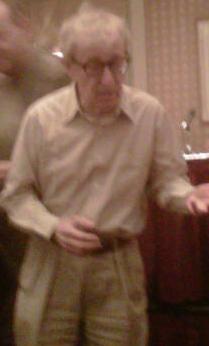
Main Page
Interviews Menu
Alphabetical Menu
Chronological Menu
 

Sony Pictures Classic releases Midnight in Paris in select theaters on May 20th, 2011. NYC MOVIE GURU: At what point in your life did you know that comedy was meant for you? Woody Allen: I was in high school. I was about 15 years old or just turning 16. And at that age, all of my peers were deciding what they were going to do about college, what [classes] they were going to take. And in my neighborhood, they were all going to become doctors or lawyers or professional men. This was a big thing. And I had no interest in any of that at all. I had infantile interest. You’d be remarkably surprised. I wanted to be a cowboy. I wanted to be a private detective. These were the things that were on my mind at the time. I had no substantial interests whatsoever. But I was always amusing to my friends. And someone said to me, “Why don’t you write down some of the jokes you’re always making, and send them in, and see if there’s anything to them?” So, after school — I was going to Midwood High School in Brooklyn — I came home at 1 o’clock, I wrote some jokes on a page, and I mailed them in to the New York Post. Earl Wilson was a columnist, and I found that he printed them. And suddenly, my name was appearing weekly, in Walter Winchell’s column or Wilson’s column. It gave me great confidence that I could write things, and people other than my friends in school thought they were funny on a professional level. Then I got a phone call from an advertising agency that had called Earl Wilson and said, “Who is this guy?’ And he said, “He’s some school kid in Brooklyn.” And they called and offered me $25 a week to come in and write jokes for them. So I came in, and I wrote jokes, and from there, I got to write a radio show and a television show. I was working steadily from when I was 16 years old on. I’ve never stopped. I’ve never been unemployed. I’ve always worked. That’s why I’ve always been such a big proponent of luck. I’ve had nothing but breaks. Everything that I wanted that was not controllable by me fell in. Whatever I wanted, I got, not by sheer accomplishment, but by pure luck, very often. So it’s been great. Otherwise, I would be a cowboy or a detective. NYC MOVIE GURU: What valuable lessons have you learning about writing comedy throughout the years? WA: I learned that just writing jokes, you could make a very good living, but there was no future in that. You had to learn basic structure. First, little sketches, [like] the little sketches you would see on “The Sid Caesar Show” or on television. Then, you had to learn play structure. You wanted to incorporate you comic gift in something substantial, like a play, which today is much more substantial in writing than a film script. A film script, you can go in with 20 pages of no dialogue, if you wanted, and still make a film. There are guys like Mike Leigh or Ingmar Berman who will do that and make fabulous films. But I wanted to learn how to write. I was studying play writing, not at school, and trying to learn to structure. So it wouldn’t be just my whole life. I wouldn’t be a guy who would write 10 jokes for Bob Hope about something. I wanted to write more important things. And eventually, what happens is you learn it without thinking you’re learning it. I guess it’s like driving a car or something. You keep doing it. And without learning how to do it because there’s no exact science to it, but just by doing it, something happens in you. You feel it. You start to do it by feel. And then you’re home, and that’s all you need to know. Once you do it by feel, you can do it for the rest of your life. NYC MOVIE GURU: How and when do ideas usually come to you? WA: It’s unpredictable and constant. There are times when I have to force myself. When I first started, I was a television writer, and shows were on at the end of the week, and you had to come in Monday morning and write because it was live [TV]. You couldn’t just come in and wait for your muse to inspire you. You had to get in there and turn out something because something had to be on the air. I can still do that. I can get into a room and force myself. It’s no fun, let me tell you, but I can force myself. But usually, the ideas come in the course of the year. I write them down and go and look at them later. Some of them seem terrible, and I don’t know why I bothered to write them down. But others are ok. In the case of Midnight in Paris, interestingly enough, I was going to make a film in Paris because it was being financed, and I had no idea for a film in Paris. And I was just thinking and thinking and thinking. And I thought that it would be a romantic film because we all grew up on Paris in the movies as romantic. And I thought of the title “Midnight in Paris.” I thought, “Gee, that’s a very romantic title. That’s a great title for a movie.” And for a long time, six weeks or so, I didn’t know what happened at midnight in Paris. I figured, “So, what goes on in Midnight in Paris? Do two people meet? Are they having an affair?” And then one day it occurred to me that one day the protagonist would be walking down the street and a car would pull up, and there’d be some exciting people, and they say, “Get in,” and take him on adventure. And that’s the way it happened. It was very unpredictable and capricious. NYC MOVIE GURU: Have you ever been called a Communist like Gil gets called in Midnight in Paris? WA: I've never been called a Communist. I could never even share a bathroom. I’m not a Communist in any way, and I was never accused of it. I'm a Democrat, and I just wanted to make the girl's parents in the movie antithetical to Gil. I wanted him to try and be a good-natured guy who tried to get along with everybody, and the mother was annoyed that [Inez] was marrying him, figuring her daughter could do better, and that the father didn't like him politically. They belong to that strain of Americans who are always critical of France and always have a problem, who wanted to change it to Freedom fries from French-fried potatoes. I just thought that would be funny, but I had no other motivation other than that. It expresses my own political feelings. I would never do anything that didn't, that ran antithetical. I wouldn't make my hero a fascist, for example. But I was really just trying to be amusing. NYC MOVIE GURU: Was your screenplay written in stone or did you allow for some flexibility? WA: The screenplay is not written in stone remotely. As soon as they're hired for the movie, I tell them that they're free. If there are any speeches that they don't want to do, if there’s anything they want to add or subtract or change, [I tell them to] go right ahead and do it. And I watch them closely, and if there's some egregious mistake they make, I tell them. But most of the time, they don't. If there's a joke or a speech I wrote that embarrasses them to say, they don't want to say it, and they don't say it, and I couldn't care less. Or they can say it in their own words. If they see the scene and they feel more comfortable doing it their way, or they don’t want to walk where I tell them to walk and they walk someplace else, that's fine with me. I don’t really care, as long as the thing gets done believably on the screen. If a guy is going to come home and tell his wife that he wants a divorce, I don’t care if they use my words or if the actor comes home and tells his wife in his own way and she responds in her own way. As long as they make it real or exciting or amusing, I'm very, very happy---to take credit for it later. NYC MOVIE GURU: Who are some of your cultural icons who influenced you? WA: My cultural icons were S.J. Perelman, Groucho Marx and, when I got a little older, Ingmar Bergman was a big hero of mine. I would say that those were the main ones. And it’s an odd combination because I started out as a television writer and became a cabaret comedian and then a television comedian. My influences were Groucho Marx and Ingmar Bergman, and and you couldn’t get two more disparate kinds of personalities. That’s what I was doing at the time. It made for an either interesting or disconcerting presentation for me. People either found it disconcerting and didn’t love it, or they did and found it the combination interesting. NYC MOVIE GURU: What was the transition like between shooting in New York and shooting abroad? WA: First off, I can’t leave business matters completely unconcerned because I went originally to London because they offered to back Match Point. I had a very nice experience in London, and I found that that the foreign crews are just like the American crews, and it was easy to work and no problem. I found the same thing in Barcelona and Paris. Their film crews, electricians and carpenters know what to do. The language barrier is not minimal. Most of them speak a little English or I can struggle through a minimum amount of French, and you learn to communicate quickly. In the United States, I worked with a Chinese cameraman for three pictures, for three years, who never spoke a word of English — ever. But it doesn’t matter. You’re talking about the same things. Once you learn the same hand signals, everything is the same. So, it’s no problem working in foreign countries. It’s the exact same thing. I am working in big cities: London, Barcelona and Paris. This coming summer, it will be Rome. It’s just like working in New York. Everybody is very professional and very nice. One nice perquisite is that these foreign countries welcome you so generously. They want so badly for you to make a film in Barcelona or Paris or Rome that everybody cooperates in such generous ways. They close off streets, and you get police help. It’s just wonderful working abroad because they’re so enthused over it. NYC MOVIE GURU: What filmmakers inspired you to reinvent yourself by shifting your films from New York to Europe? WA: The only person who comes to mind, although I’m sure that there are many others, was a wonderful film director, Jules Dassin, who was terrific in New York and did some very good films, and then left for Paris because of the blacklisting. And when he went abroad, although he did do good work in New York in The Naked City which revolutionized a whole way of looking at certain kind of films in the city, but when he went abroad, he did Rififi and Greek films that he did with his wife. He did some of his very, very best work as an expatriate. And why not? You get a new location, fresh sites. As I said, the people [working abroad] are every bit as good and competent: the crews, the actors and actresses are great. So, it’s not a tough thing. It’s not like you leave home and you’re stranded in the desert and nobody knows what to do with the lights. It isn’t like that. You go to a new city, and it’s great, and you have new restaurants and new places to go to. It’s very exciting, actually. NYC MOVIE GURU: What do you think are the basic elements that turn a romantic comedy into a classic? WA: You find that, over the years, certain comedies remain fun to see 50 years later and other romantic comedies, which were delightful for people at the time, do not. When I was a boy, I went to see many films that were delightful romantic comedies with June Allyson and Esther Williams and Gloria DeHaven, and I liked them just fine. But now they’ve kind of vanished. And there were others I saw, like The Shop Around the Corner , that year after year remain wonderful films. You look up after many years and you find that a movie has become a classic because it has become meaningful to people and remains alive decade after decade. NYC MOVIE GURU: Are you interested in filming in New York again? WA: I would love to. New York is a fabulous city to work in because there are a million things to do here. There are a million stories to tell and a million great locations in the city. I made many, many movies here, and I don’t think it even scratched the surface of New York City. It’s great also that there’s a certain advantage of being in your own home. For instance, I’m going to Rome this summer, so I’m not going to be able to see any baseball. That’s a big loss for me. I will have three months of a hotel shower. I’ve got a great shower [at home]. It comes down hard and hot. So, it’s nice to work at home. I like having my own bed, my own house, and more of my surrounding pharmaceuticals. But there are exciting things abroad as well. NYC MOVIE GURU: If you could time travel, which era would you travel to? WA: Time travel is a tricky thing because you extrapolate only the best. If you go back in time, women were dying the childbirth, and people had tuberculosis, and you'd go to the dentist and they’d drill, and it killed you. It was not so pleasant, really. But you go back and think of Gigi and horse and carriages and champagne and Maxim's, it’s all so [romantic]. I'd like to time travel back — for the day. Go back to the Belle Époque, have lunch, and come home. That would be the great trip for me. If we could do that, that would be a wonderful thing. I would go to the Belle Époque Paris, the same things Marion Cotillard said [as Adriana in Midnight in Paris]. 1920s Paris would be someplace I’d like to go to also. But Belle Époque Paris, before all the stores on the Champs-Élysées, and those terrible T-shirt and postcard joints along the river, when the way it was conceived had to be astonishingly beautiful. You can't fathom how beautiful it must have been, because it’s drop-dead beautiful now. It’s [now] full of these commercial stores that have opened up there. So it would’ve been great. I would not like to have been trapped there and not be a good thing. NYC MOVIE GURU: What movie are you working on next? WA: I’m doing this movie in Rome this summer, starring Alec Baldwin and Ellen Page and Jesse Eisenberg and Penélope Cruz and Judy Davis and Roberto Benigni and myself and some Italian people that we’re casting at the moment. It's a broad comedy — not a romantic comedy — of various tales interwoven. I'm one of them, in one of them. All the parts are quite significant; there are no cameos. They’re all significant parts. There just happened to be a part that I could play. I can't play the love interest anymore, and, of course, this is tremendously frustrating because that’s really what I want to play. I wanted to play Owen’s part [in Midnight in Paris]. I wanted to play all the parts that I’ve always played [as the romantic lead], but they’re not as believable anymore. So I have to play Pops, the backstage doorman at the theater or something like that. So there is a part for me [in my upcoming film]. My wife and myself go to Rome because our daughter is going to marry an Italian boy that she met there, and we’re going over to meet him and meet his family, and what ensues. The film is very broadly funny. Main Page Interviews Menu Alphabetical Menu Chronological Menu ______________________________________________________ |
The NYC Movie Guru
themovieguru101@yahoo.com
Privacy Policy